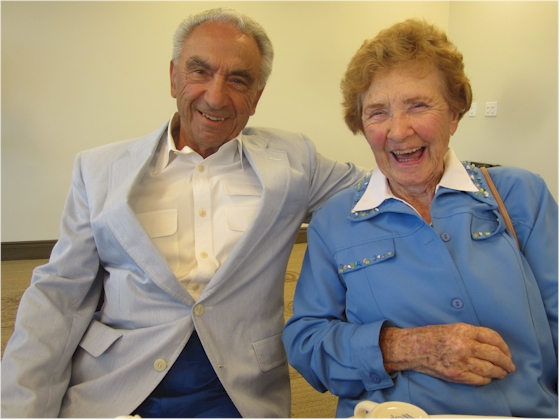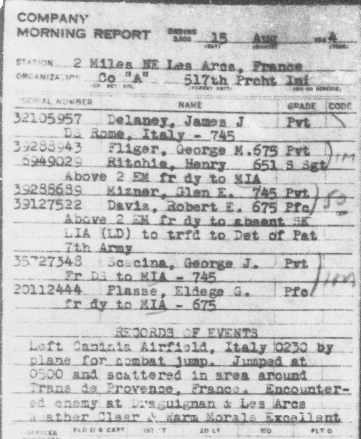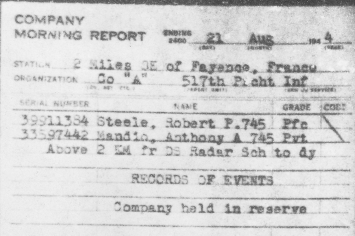
Anthony Mandio

Headquarters Company and A Company, 1st Battalion, 517th PRCT
Anthony Mandio, 1st
Bn. HQ most of the time and A Company some of the time. He volunteered for the
army, lying about his age, and for the paratroops.
Tony served as a Pathfinder. Every battalion had a unit of Pathfinders.
He and his good buddy George Scecina volunteered together. On the jump, George
was killed, and several others were hit. "The jump was a disaster." We were a
small group and scattered all over.
Pathfinders go in first, with the best pilots. It was so foggy when we flew in,
we thought he was over the sea. He'd already been planning how when he saw the
other guys drift away - "so then you know you're alone." He'd been thinking
about how to ditch his equipment during a water landing, and had realized that
he was unable to reach his jump knife. He realized he was over land, not water,
at the very last minute.
One of the problems was that when the red light went on, the jumpmaster paused,
and then paused again when the green light went on. Then, only the first half of
hte stick exited, and there was a break in the stick. They were scattered all
over. There were some German patrols and minor skirmishes.


All of the batallion was at the Col de Braus area for a while - trench warfare
there. They were relieved in October or November and walked from Sospel to Nice,
staying in Nice for a while. They went to Northern France in 40 and 8's - "and
that was a very nice trip. When we got to a town, we'd jump off and try to get a
drink or something to eat."
The unit went to Soissons - and was then pressed into service in Belgium. Issued
ammo and packed in trucks to get tot he front lines. They approached the Soy-Hotton
area, and the trucks turned around so fast it was tempting to jump on and head
back!
They were in the Ardennnes and the Ruh Valley, which was a minefield near a dam,
adjacent to the Hurtguren forest. We were being used as bait - it was a feint
operation.
He vowed to himself that he'd never be cold again, but eventually took up skiing
and really enjoyed it.
"At the end of the war, I had a lot of points. I chose occupation, and was with
the 82nd in Berlin. I got home in November. Berlin was interesting. One day on
and two days off - we would go to Tiergarten with our cigarettes and our
chocolate - the Russians would bring counterfeit money - the Germans brought
cameras - and we'd all trade until the MPs broke it up."
"Berlin had been destroyed, but there were some places that were untouched. We
had a nice apartment."
|
Jul Talarico (front) and Tony Mandio (rear) playing football in Berlin Sept, 1945 |
Berlin was separated into quarters: Russian, English, French and American
quarters. When I finally got out of Berlin, they took us by train to Harvre in
France, and sailed on a liberty boat. A dinky ship, I was sick for four days.
Bristol, PA was home then. I heard about the 20-20 club: I saved my 20 dollars
every week, and by the end, the program had disappeared (replaced by the GI
Bill). Tony attended Temple Undergrad and Temple Law, all on the GI Bill except
the very last year of law school, and has been a lawyer ever since.
My mother had always been mad at me because I'd lied about my age to get into
the army. Mamie was a great cook - she could whip up a great Italian meal in 10
minutes. When I was a kid, I did anything - set up bowling pins, deliver ice,
anything to make money. We didn't have a phone.
I married Rosemarie Welsh, and we've been married for 65 years, and we have five
children. My second son was a Marine captain (7 years) and is now a judge. Law
school was in California, which saved me a lot of money! We have five
grandchildren and a great-grandchild.
Received from Anthony Mandio, via interview by Claire Giblin
June 2015, New Orleans, LA